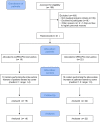A RCT Comparing Specific Intensive Cognitive Training to Aspecific Psychological Intervention in RRMS: The SMICT Study
- PMID: 25628596
- PMCID: PMC4292447
- DOI: 10.3389/fneur.2014.00278
A RCT Comparing Specific Intensive Cognitive Training to Aspecific Psychological Intervention in RRMS: The SMICT Study
Abstract
Background: Specific cognitive rehabilitation in multiple sclerosis (MS) resulted to be effective compared to no treatment. So far the possible role of an aspecific psychological intervention on cognition has not been investigated.
Objective: The aim of the SMICT RCT was to compare the efficacy of a specific cognitive training with an aspecific psychological intervention in relapsing-remitting MS patients.
Methods: From a sample of 150 patients, with the same disability and immunomodulatory therapy, submitted to neuropsychological examination, 45 impaired in at least one test were included and 41 randomized to have either a specific cognitive training for the impaired function (22) or to an aspecific psychological intervention (19) for 4 months, starting after baseline examination. Neuropsychological tests and functional scales were administered at baseline and 1 year later.
Results: After 1 year, the mean number of pathological tests was significantly lower in the specific treatment group, compared to the aspecific group. Memory and attention/speeded information processing functions were mostly improved. Depression and quality of life were not different between groups at follow up.
Conclusion: Our study demonstrates that an intensive and domain specific cognitive approach results to be more effective than aspecific psychological intervention in patients with MS.
Keywords: attention; cognitive rehabilitation; executive functions memory; information processing speed; multiple sclerosis; multiple sclerosis cognitive rehabilitation.
References
LinkOut - more resources
Full Text Sources
Other Literature Sources


